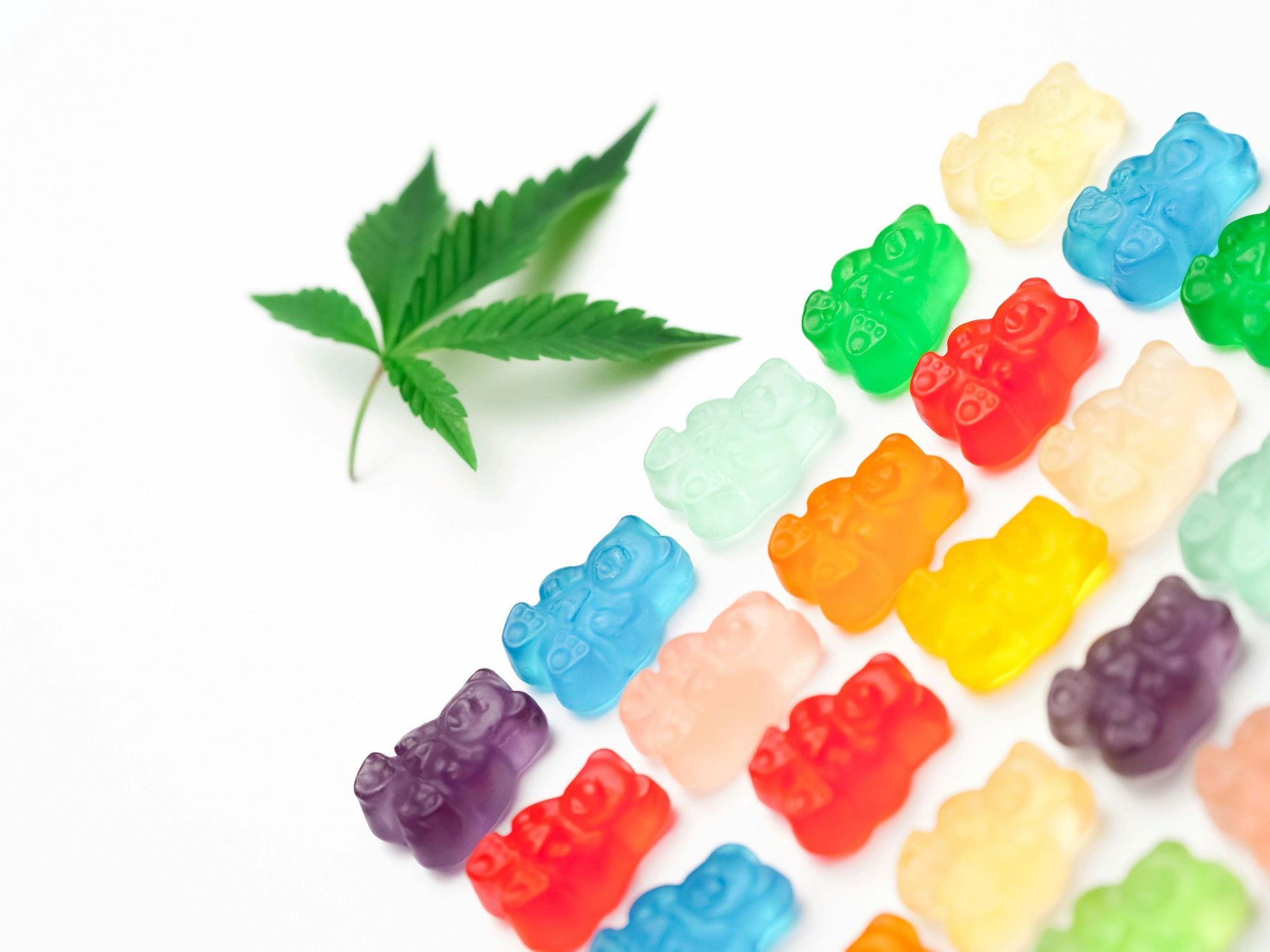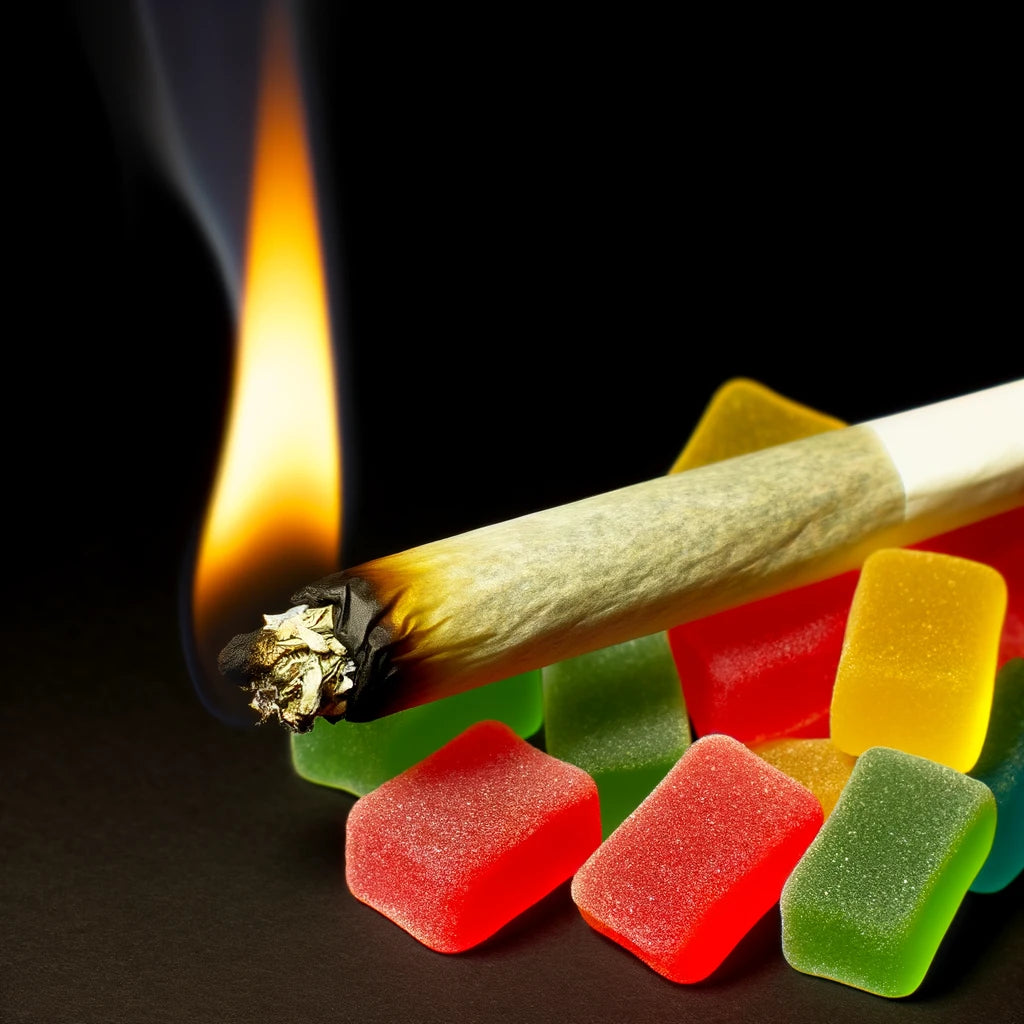THC Gummies Side Effects?
THC gummies offer a discrete and convenient way to consume cannabis, especially for those looking to avoid the smoke and vapor of traditional methods. However, like all forms of cannabis, they come with their own set of side effects and considerations, particularly due to their method of ingestion and the body's processing of THC through the digestive system.
How do the side effects of THC gummies differ from those experienced with other forms of cannabis consumption?
Inhalation vs. Ingestion: Analyzing Side Effect Profiles
Inhaling cannabis, whether through smoking or vaping, introduces THC directly into the bloodstream via the lungs, resulting in a quicker onset of effects. Conversely, THC gummies must navigate the digestive system, leading to a delayed onset of effects and a different side effect profile. Users of THC gummies may experience more pronounced and longer-lasting effects, including heightened anxiety or paranoia, due to the conversion of THC to 11-hydroxy-THC in the liver, which is more potent and has a longer half-life in the body.
Onset and Duration: A Comparative Overview
The effects of inhaled cannabis typically manifest within minutes, peaking quickly and tapering off within a few hours. Edibles, however, can take anywhere from 30 minutes to 2 hours to take effect, with the peak lasting much longer and the entire experience potentially extending up to 12 hours or more. This extended duration increases the risk of overconsumption, as users might ingest more, thinking the edibles are not working.
What are the long-term cognitive effects of consuming THC gummies, especially in young adults?
Cognitive Development and THC: Unpacking the Research
Studies have raised concerns about THC's impact on cognitive development, particularly in adolescents and young adults. Regular consumption of THC gummies can potentially alter brain development, affecting memory, learning, and attention spans. The potency of edibles and their extended duration in the system make them a particular concern for long-term cognitive health.
Adolescent Brain on THC Gummies: Longitudinal Studies Insights
Longitudinal studies indicate that youth who frequently consume cannabis, including edibles, may experience significant cognitive impairments, not only while under the influence but also in their overall cognitive functioning over time. These effects could include altered brain structure and function, particularly in areas responsible for memory, decision-making, and impulse control.
What not to do after eating edibles?
Why is it advised to avoid operating heavy machinery or driving after consuming edibles?
Impaired Motor Skills and Reaction Times: The Science Explained
The delayed onset of edibles can be deceptive, leading some to believe they can drive or operate machinery safely before the full effects kick in. THC impairs judgment, motor coordination, and reaction times, making such activities dangerous.
Legal Implications and Safety Concerns
Many jurisdictions have strict laws against driving under the influence of THC, with edibles being no exception. The legal ramifications of being caught can be severe, including fines, license suspension, and even imprisonment.
How does the consumption of alcohol or other substances interact with the effects of edibles?
Compound Effects: Alcohol and THC Synergy
Combining alcohol with THC gummies can exacerbate the effects of both substances, leading to increased impairment, nausea, vomiting, and a heightened risk of overconsumption. The combination can also lead to more severe cognitive and motor impairments.
Risk Management: Understanding Substance Interactions
It's crucial to understand how substances interact within your body. Mixing THC with alcohol or other drugs can lead to unpredictable effects, making it important to consume responsibly and be aware of the potential for adverse reactions.
What are the cons of taking edibles?
What are the potential risks of edibles in terms of dosage inconsistency and the delayed onset of effects?
Dosage Dilemma: Navigating the Uncertainties
The main challenge with edibles is the difficulty in dosing accurately. THC concentration can vary widely from one gummy to the next, even within the same batch. This inconsistency poses a risk for both new and experienced users, as it's challenging to predict how strong the effects will be.
Timing the High: Challenges of Predicting Onset
The delayed onset of effects with edibles often leads to overconsumption, as users might ingest more, thinking the initial dose was insufficient. This can result in uncomfortable or even harmful levels of intoxication once the effects finally manifest.
How does the consumption of edibles impact individuals with pre-existing mental health conditions?
THC and Mental Health: A Delicate Balance
For those with pre-existing mental health conditions, such as anxiety or depression, THC gummies can sometimes exacerbate symptoms. The potent and prolonged effects of edibles make it especially important for these individuals to approach consumption with caution.
Personalizing Cannabis Use: Strategies for Sensitive Populations
Individuals with mental health concerns should consider lower doses, opt for CBD-dominant edibles, or consult a healthcare provider for personalized advice. Monitoring reactions closely and adjusting consumption patterns can help manage the impact on mental health.
Can edibles still affect you the next day?
What factors contribute to the duration of edibles' effects, potentially extending into the next day?
Metabolism and Persistence: Why Edibles Stick Around
The duration of effects from THC gummies is influenced by various factors, including metabolism, body composition, and the amount consumed. Slow metabolism can extend the presence of THC in the system, leading to prolonged effects.
Next-Day Residuals: Functional Impacts and Recovery
It's not uncommon for users to wake up feeling "foggy" or still under the influence the day after consuming edibles. This can affect daily activities and responsibilities, highlighting the need for careful dosing and timing of consumption.
How do the residual effects of edibles compare to the after-effects of smoking or vaping cannabis in terms of cognitive functioning?
Cognitive Aftermath: Edibles vs. Inhalation
The cognitive after-effects of edibles can be more pronounced and longer-lasting than those from smoking or vaping. Users might experience reduced cognitive functioning, memory impairment, and difficulty concentrating even after the primary effects have subsided.
Recovery Time: Returning to Baseline After Edible Consumption
The time it takes to fully recover from the effects of THC gummies can vary widely among individuals. Factors like the dose consumed, frequency of use, and individual metabolism play significant roles in how quickly one can return to their baseline cognitive function.
How long does it usually take for edibles to wear off?
What role does an individual's metabolism and body composition play in the duration of effects from edibles?
Body Type and THC Metabolism: A Personalized Look
An individual's metabolism and body composition significantly influence how quickly THC is processed and eliminated from the body. Those with faster metabolisms may find the effects wear off sooner, while those with slower metabolisms experience longer-lasting effects.
Enhancing Metabolic Understanding for Optimal Edible Experiences
Understanding one's metabolism can help in planning edible consumption, especially when needing to function effectively the following day. Adjusting doses based on personal metabolic rates can mitigate unwanted next-day effects.
How do different types of edibles (fat-based vs. sugar-based) affect the onset and duration of their effects?
Fat vs. Sugar: Absorption Rates and Their Impacts
The composition of edibles can affect how THC is absorbed into the body. Fat-based edibles, like chocolates or cannabis-infused butter, may facilitate a quicker and more efficient absorption of THC, potentially leading to a faster onset and longer duration of effects compared to sugar-based edibles.
Recipe for Relief: Choosing the Right Edible Composition
Selecting the right type of edible based on its fat or sugar content can help users manage the onset and duration of effects. Those seeking a more gradual experience may opt for sugar-based edibles, while individuals looking for quicker relief might choose fat-based options.
What does an edible high feel like?
How does the experience of a high from edibles differ from that of inhaled cannabis in terms of psychological and sensory perceptions?
The Edible Experience: A Journey Through the Senses
The high from edibles is often described as more intense and body-focused than that from smoking or vaping. Users report a deeper sense of relaxation and euphoria, with effects that can encompass both heightened sensory perceptions and more profound introspective experiences.
Mind Matters: Psychological Depth of Edible Highs
The psychological effects of edibles can be more complex and varied, with users experiencing everything from enhanced creativity and well-being to increased anxiety or paranoia, depending on the dose and their individual response to THC.
What are the common psychological effects of edibles and how do they vary based on THC concentration?
THC Tolerance and Psychological Response: A User's Guide
The psychological effects of edibles are significantly influenced by the user's tolerance to THC. Those with lower tolerance may find even small amounts produce strong effects, while regular users may require higher doses to achieve the desired outcome.
High Variability: THC Concentrations and User Experiences
The concentration of THC in edibles can lead to a wide range of psychological effects, from mild relaxation to intense psychoactive experiences. Users should start with low doses and gradually increase as needed, paying close attention to their body's response.
Do edibles make you groggy in the morning?
What are the factors that contribute to feelings of grogginess after consuming edibles, and how can they be mitigated?
From Groggy to Great: Mitigation Strategies
Feeling groggy the morning after consuming edibles is often a result of overconsumption or individual sensitivity to THC. Strategies to mitigate this include starting with lower doses, choosing edibles with a balanced THC/CBD ratio, and ensuring adequate hydration and rest.
Understanding and Avoiding the Edible Hangover
The "edible hangover" can be avoided by carefully managing dosage, consuming edibles earlier in the evening to allow effects to subside by bedtime, and by staying informed about the edible's THC content and potential impact on sleep quality.
How does the timing of consumption (evening vs. daytime) affect morning-after grogginess from edibles?
Timing is Everything: Night vs. Day Consumption
Consuming edibles late at night can lead to a disruption in sleep patterns and increased grogginess upon waking. In contrast, daytime consumption allows more time for the effects to wear off before bedtime, potentially reducing next-day fatigue.
Wake-up Call: Managing Next-Day Effects
To manage next-day effects effectively, consider the timing of your edible consumption in relation to your sleep schedule. Aligning edible intake with your body's natural rhythms can help minimize morning grogginess and ensure a more restful night's sleep.
Why do I feel sick the day after edibles?
What are the physiological mechanisms behind nausea and discomfort following the consumption of edibles?
Unpacking the Discomfort: Physiological Insights
Nausea and discomfort after consuming edibles can result from several factors, including overconsumption, individual sensitivity to THC, and the body's process of metabolizing THC. Understanding these mechanisms can help in preventing and managing post-consumption discomfort.
Edibles and the Gastrointestinal Tract: A Complex Interaction
The interaction between THC gummies and the gastrointestinal system can lead to delayed gastric emptying and altered gut motility, contributing to feelings of nausea or discomfort. Consuming edibles with food may help mitigate these effects by facilitating a more gradual absorption of THC.
How does one's tolerance level to THC impact the likelihood of feeling sick the day after consuming edibles?
Tolerance Testing: Finding Your THC Threshold
Individual tolerance levels to THC play a crucial role in the likelihood of experiencing adverse effects the day after consumption. Those with lower tolerance may be more susceptible to nausea, discomfort, and other side effects, emphasizing the importance of starting with low doses.
Building Up or Breaking Down: Tolerance Dynamics
Understanding and respecting your body's tolerance to THC is essential in avoiding negative post-consumption effects. Gradually increasing dosage allows the body to build tolerance over time, potentially reducing the likelihood of feeling sick the day after consuming edibles.








